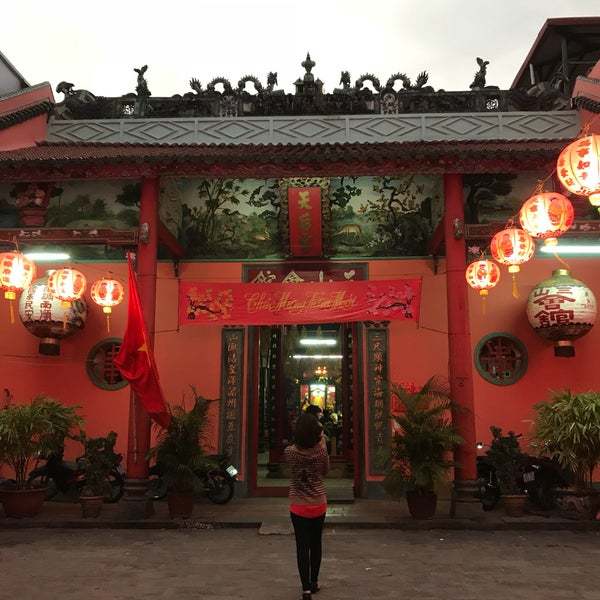A shared abode
There is a lengthy history behind the establishment and development of the Assembly Halls of the Chinese community in Vietnam, which is often referred to as a shrine, pagoda, temple or other type of structures. They are places of worship for the gods and activities of the community and guilds, based on their origins and vocations.
The number of Assembly Halls of the Chinese community in Ho Chi Minh City now stands at around 30, many of which date back more than 200 years, and are scattered throughout the city. But the majority are concentrated in District 5, around Nguyen Trai, Trieu Quang Phuc, Chau Van Liem, Tran Hung Dao, Hai Thuong Lan Ong which includes Assembly Halls named Ha Chuong, Tue Thanh, Nghia An, Quynh Phu, Phuoc An, and many others. Most of the assembly halls of the Chinese community in Ho Chi Minh City are associated with shrines and temples.
Buildings in the typical style of each linguistic group, such as Minh Huong, Chaozhou, Cantonese, and Fujian, are painted red to distinguish them from the surrounding architecture.
Traditional Chinese feng shui believes that red is a hue of good fortune, happiness, and wealth. Overlapping tiles in rows of blue or yellow are used to build the several layers that make up the assembly halls’ roofs.
To Vietnamese speakers, the "Chinese Pagoda" (Chinese temple) is a place of devotion for the Chinese community's patron deities such as Thien Hau Thanh Mau, Quan Cong, Phuc Duc Chinh than, and a variety of other gods, including Buddha.
According to analysts, the assembly hall of the Chinese community in Ho Chi Minh City has a distinctive characteristic in addition to the "shared abode" theme. It serves as an organization headquarters and performs a variety of additional duties.
A link exists between the assembly hall and temples of the Chinese, which serves both physical and mental requirements of the Chinese people, according to Assoc. Prof. Dr. Phan An, Institute of Social Sciences in the Southern region.
Originally, the assembly halls of the Chinese community in Saigon served as meeting venues for the Chinese communities. It is up to the citizens of a given state to elect their own leader. Members of the society must have faith in those who are well-regarded and knowledgeable. To ensure the smooth running of the society, he must be a person with wealth and commercial acumen.
The mayor serves as a liaison between the Chinese community and the local administration, and is approved by the local government. Maintaining order and security in the Chinese community, as well as conveying the government's directives and viewpoints, are the chief of the society's primary duties. For the government, he is also responsible for collecting state taxes from its citizens.
He, additionally, is responsible for resolving conflicts inside the state and between the cantons, fostering a strong sense of solidarity, assistance, and support among members of the community.
 |
|
An assembly hall of the Chinese community in District 5, HCM City. |
Other roles
The assembly halls of Chinese community play an essential economic role. It is a location where merchants from the same state may meet and discuss business, as well as help each other locate suppliers and marketplaces. It is also a venue where the merchants of the Chinese State and other Chinese merchants of the same dialect come to transact and promote commerce in Saigon's Assembly Halls.
With the social function of a shared abode, Assembly Halls of the Chinese community in HCM City are meeting places where people get together to exchange ideas, debate issues, collaborate on projects, and so on. It is also a place where the state's neediest citizens may receive assistance and support. Charitable activities can be carried out by all clubs. The Chinese people’s long-term survival in old Saigon relied heavily on the use of the assembly hall.
As regards cultural duty, the assembly halls of the Chinese community in Saigon - Ho Chi Minh City is always linked to religious institutions. The establishments are normally referred to as either a Chinese pagoda or the official name itself, or an assembly hall using a combination of both.
For these reasons and more, the assembly hall of Chinese community in Vietnam has a special place in Vietnamese history. To ensure the survival of the Chinese people, assembly halls play a vital role in preserving the nation's cultural identity, linking the community, meeting and exchanging locations, doing business, and being an important element in Chinese life.
In short, the Chinese assembly hall in Vietnam is associated with the history of immigration, settlement and cultural acclimatization. There are several ways in which the Chinese people are able to sustain themselves and their culture, including the use of assembly halls to interact with the community, exchange ideas with other members and do business in the community, and integrate with the local social life with the characteristics of their nation preserved.
Hang Linh

HCM City plans to welcome international visitors later this year
Ho Chi Minh City is anticipated to welcome the return of foreign visitors with vaccine passports this December instead of 2022 as planned, according to local authorities.